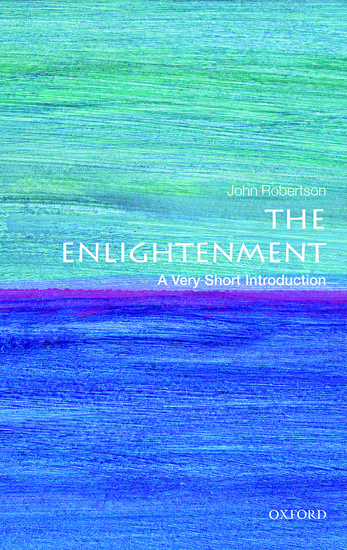Home >
A Very Short Introduction >
The Enlightenment (Philosophy)
A Very Short Introduction | Philosophy
The Enlightenment
ISBN: 9780199591787
Series: A Very Short Introduction
The Enlightenment (Philosophy)
A Very Short Introduction The Enlightenment (Philosophy) Media > Books > Non-Fiction > Education Books Expect Delays of Up to 4 Weeks| Order Below |
ISBN
9780199591787 (10-digit ISBN: 0199591784)
- Description
- Key Features
- Series Description
- Table of Contents
- Offers a comprehensive and concise account of the Enlightenment intellectual movement
- Emphasises the geographical reach of the Enlightenment, while doing justice to the central role of French thinkers
- Places the Enlightenment in its eighteenth-century context
- Covers key thinkers such as Franco Venturi, Pierre Bayle, Jonathan Israel, David Hume, and Jean-Jacques Rousseau
A foundational moment in the history of modern European thought, the Enlightenment continues to be a reference point for philosophers, scholars and opinion-formers. To many it remains the inspiration of our commitments to the betterment of the human condition. To others, it represents the elevation of one set of European values to the world, many of whose peoples have quite different values. But what is the relationship between the historical Enlightenment and the idea of 'Enlightenment', and can these two understandings be reconciled?
In this Very Short Introduction, John Robertson offers a concise historical introduction to the Enlightenment as an intellectual movement of eighteenth-century Europe. Discussing its intellectual achievements, he also explores how its supporters exploited new ways of communicating their ideas to a wider public, creating a new 'public sphere' for critical discussion of the moral, economic and political issues facing their societies.
Reading Guide
Oxford's Very Short Introductions series offers concise and original introductions to a wide range of subjects--from Islam to Sociology, Politics to Classics, Literary Theory to History, and Archaeology to the Bible.
Not simply a textbook of definitions, each volume in this series provides trenchant and provocative--yet always balanced and complete--discussions of the central issues in a given discipline or field. Every Very Short Introduction gives a readable evolution of the subject in question, demonstrating how the subject has developed and how it has influenced society. Eventually, the series will encompass every major academic discipline, offering all students an accessible and abundant reference library.
Whatever the area of study that one deems important or appealing, whatever the topic that fascinates the general reader, the Very Short Introductions series has a handy and affordable guide that will likely prove indispensable.
Please note: As this series is not ELT material, these titles are not subject to discount.
1: Definitions of Enlightenment
2: Pre-Enlightenment
3: Enlightenment ideas
4: Enlightening society
5: The politics of Enlightenment
6: The legacy of Enlightenment
Further Reading
Index
A foundational moment in the history of modern European thought, the Enlightenment continues to be a reference point for philosophers, scholars and opinion-formers. To many it remains the inspiration of our commitments to the betterment of the human condition. To others, it represents the elevation of one set of European values to the world, many of whose peoples have quite different values. But what is the relationship between the historical Enlightenment and the idea of 'Enlightenment', and can these two understandings be reconciled?
In this Very Short Introduction, John Robertson offers a concise historical introduction to the Enlightenment as an intellectual movement of eighteenth-century Europe. Discussing its intellectual achievements, he also explores how its supporters exploited new ways of communicating their ideas to a wider public, creating a new 'public sphere' for critical discussion of the moral, economic and political issues facing their societies.
Reading Guide
Key Features
- Offers a comprehensive and concise account of the Enlightenment intellectual movement
- Emphasises the geographical reach of the Enlightenment, while doing justice to the central role of French thinkers
- Places the Enlightenment in its eighteenth-century context
- Covers key thinkers such as Franco Venturi, Pierre Bayle, Jonathan Israel, David Hume, and Jean-Jacques Rousseau
Series Description
Oxford's Very Short Introductions series offers concise and original introductions to a wide range of subjects--from Islam to Sociology, Politics to Classics, Literary Theory to History, and Archaeology to the Bible.
Not simply a textbook of definitions, each volume in this series provides trenchant and provocative--yet always balanced and complete--discussions of the central issues in a given discipline or field. Every Very Short Introduction gives a readable evolution of the subject in question, demonstrating how the subject has developed and how it has influenced society. Eventually, the series will encompass every major academic discipline, offering all students an accessible and abundant reference library.
Whatever the area of study that one deems important or appealing, whatever the topic that fascinates the general reader, the Very Short Introductions series has a handy and affordable guide that will likely prove indispensable.
Please note: As this series is not ELT material, these titles are not subject to discount.
EASY ORDER FORM
PRICES LISTED INCLUDE CONSUMPTION TAX
Price Before Tax:
¥1,790


